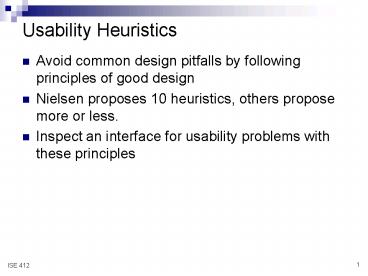Usability Heuristics PowerPoint PPT Presentation
Title: Usability Heuristics
1
Usability Heuristics
- Avoid common design pitfalls by following
principles of good design - Nielsen proposes 10 heuristics, others propose
more or less. - Inspect an interface for usability problems with
these principles
2
Ten Usability Heuristics (from Jakob Nielsen)
- Visibility of system status
- The system should always keep users informed
about what is going on, through appropriate
feedback within reasonable time. - Match between system and the real world
- The system should speak the users' language, with
words, phrases and concepts familiar to the user,
rather than system-oriented terms. Follow
real-world conventions, making information appear
in a natural and logical order. - User control and freedom
- Users often choose system functions by mistake
and will need a clearly marked "emergency exit"
to leave the unwanted state without having to go
through an extended dialogue. Support undo and
redo.
http//www.useit.com/papers/heuristic/heuristic_
list.html
3
Nielsens Usability Heuristics (cont.)
- Consistency and standards
- Users should not have to wonder whether different
words, situations, or actions mean the same
thing. Follow platform conventions. - Error prevention
- Even better than good error messages is a careful
design which prevents a problem from occurring in
the first place. - Recognition rather than recall
- Make objects, actions, and options visible. The
user should not have to remember information from
one part of the dialogue to another. Instructions
for use of the system should be visible or easily
retrievable whenever appropriate. - Flexibility and efficiency of use
- Accelerators -- unseen by the novice user -- may
often speed up the interaction for the expert
user such that the system can cater to both
inexperienced and experienced users. Allow users
to tailor frequent actions.
4
Nielsens Usability Heuristics (cont.)
- Aesthetic and minimalist design
- Dialogues should not contain information which is
irrelevant or rarely needed. Every extra unit of
information in a dialogue competes with the
relevant units of information and diminishes
their relative visibility. - Help users recognize, diagnose, and recover from
errors - Error messages should be expressed in plain
language (no codes), precisely indicate the
problem, and constructively suggest a solution. - Help and documentation
- Even though it is better if the system can be
used without documentation, it may be necessary
to provide help and documentation. Any such
information should be easy to search, focused on
the user's task, list concrete steps to be
carried out, and not be too large.
5
Rating Problem Severity
- Severity is based on 3 things
- impact
- frequency
- persistence
- Ratings (modified from Nielsen)
- 0. Not a problem
- 1. Cosmetic problem should be addressed if
schedule permits. - 2. Grammatical, spelling, or other errors should
be fixed as they can affect users impressions of
the interface and its creators, but wont impact
usability. - 3. Minor problem should be fixed if possible as
this will be an annoyance to users, but wont
affect ability to achieve goals. - 4. Major problem important to fix, as this will
impact users ability to achieve goals. - 5. Catastrophic problem must be fixed before
product is released.
6
Heuristic Evaluation Methodology
- Develop a scenario of use
- identify typical user, his/her goal(s),
expectations, background experience, knowledge,
etc. - define a set of objectives to be achieved
- if appropriate, sketch out users mental model of
how the objective(s) should be achieved (based on
previous experience, common practice, etc.) - Access the site under consideration
- take the perspective of the user you identified
in step 1 attempt to achieve the objectives. - take note of the path, your impressions,
potential problems, etc. - Rerun the path, taking screen shots of problem
pages - paste pages into a Powerpoint file
- Annotate the screen shots
- circle sources of problems
- describe the problem
- assign a severity rating
7
An Example
- E-commerce web site.
- In some cases, the first impression a potential
customer will get. - For online retailers, the ONLY impression the
customer will get! - The following pages represent a portion of the
evaluation (full evaluation can take anywhere
from several hours to several days, depending on
the size and complexity of the site and number of
usability problems.)
8
3
This should let you know what might be
recalled. User must go through 3 screens to
determine if their product is recalled.
4
1
Blank space (bigger on larger screens) redesign
to resize automatically.
3
Have to scroll down to see the majority of useful
information.
9
What do we expect a visitor to want to do? Find
out about Whirlpool Corp or find out about
products these should be arranged, separated,
etc.
3
10
Too many steps to get to this point and still
several to go before I can purchase the product.
4
No way to learn anything about the retailer
just information about how to prepare for
delivery.
4
11
Your Turn
- Go to this web site and choose one link to
follow. Perform a heuristic evaluation of the
site as it is now. - Spend a few minutes navigating the site. Make
notes on your initial impressions, incidents of
difficulty or confusion, annoying features, and
anything that impresses you about the site. Be
sure to note specific pages you wish to return to
for the next step. - Select at least 3 pages that have typical or
particularly egregious violations of good design
that you wish to highlight. - Use the printscreen function to copy and paste
each page into a Powerpoint presentation. - Annotate the pages as shown on the previous pages
and using the severity ratings given on slide 5. - Send the Powerpoint evaluation to me via email.
- Perform a heuristic evaluation of your project. I
will do the same and will send it to you by
Friday.

